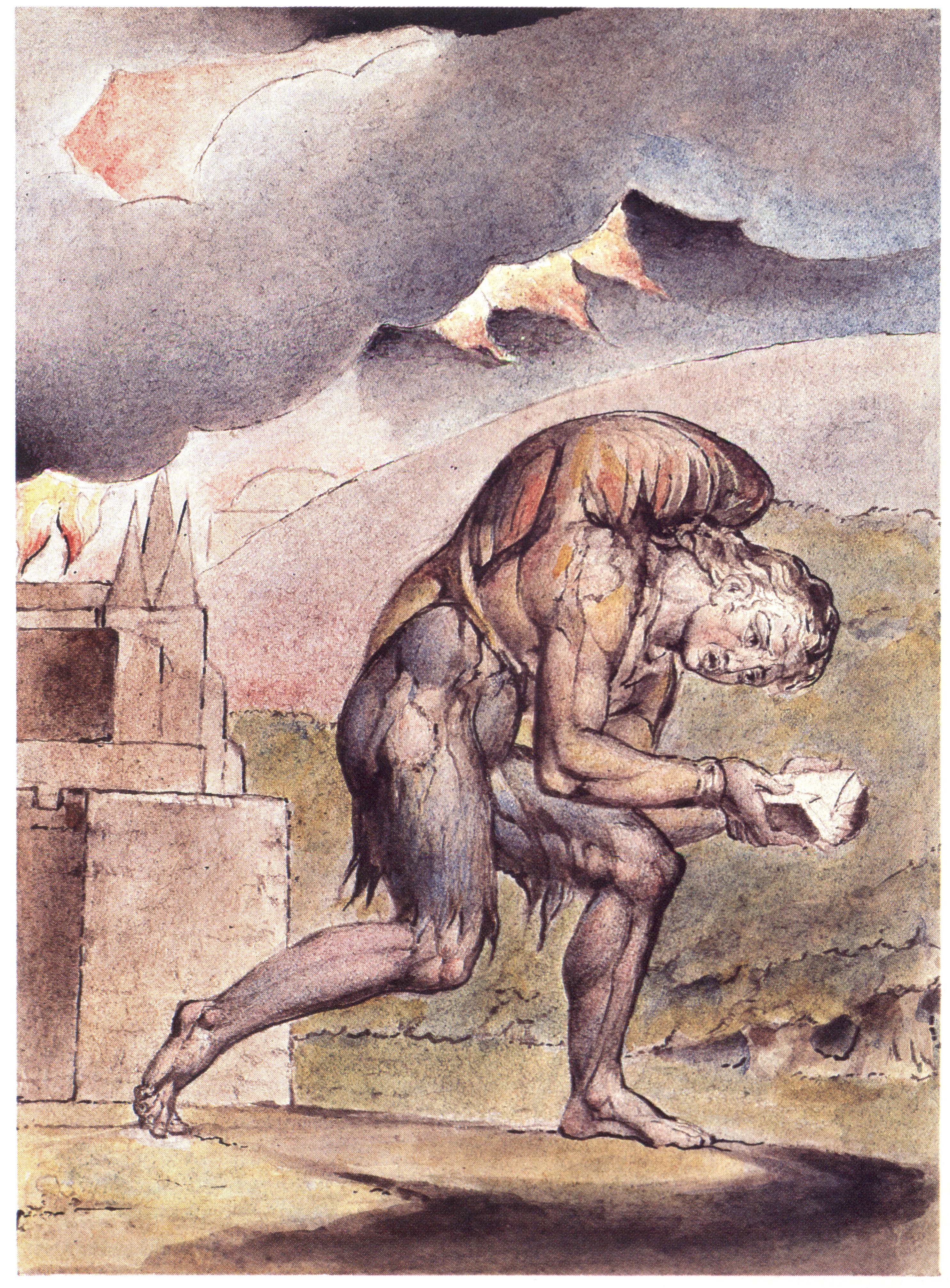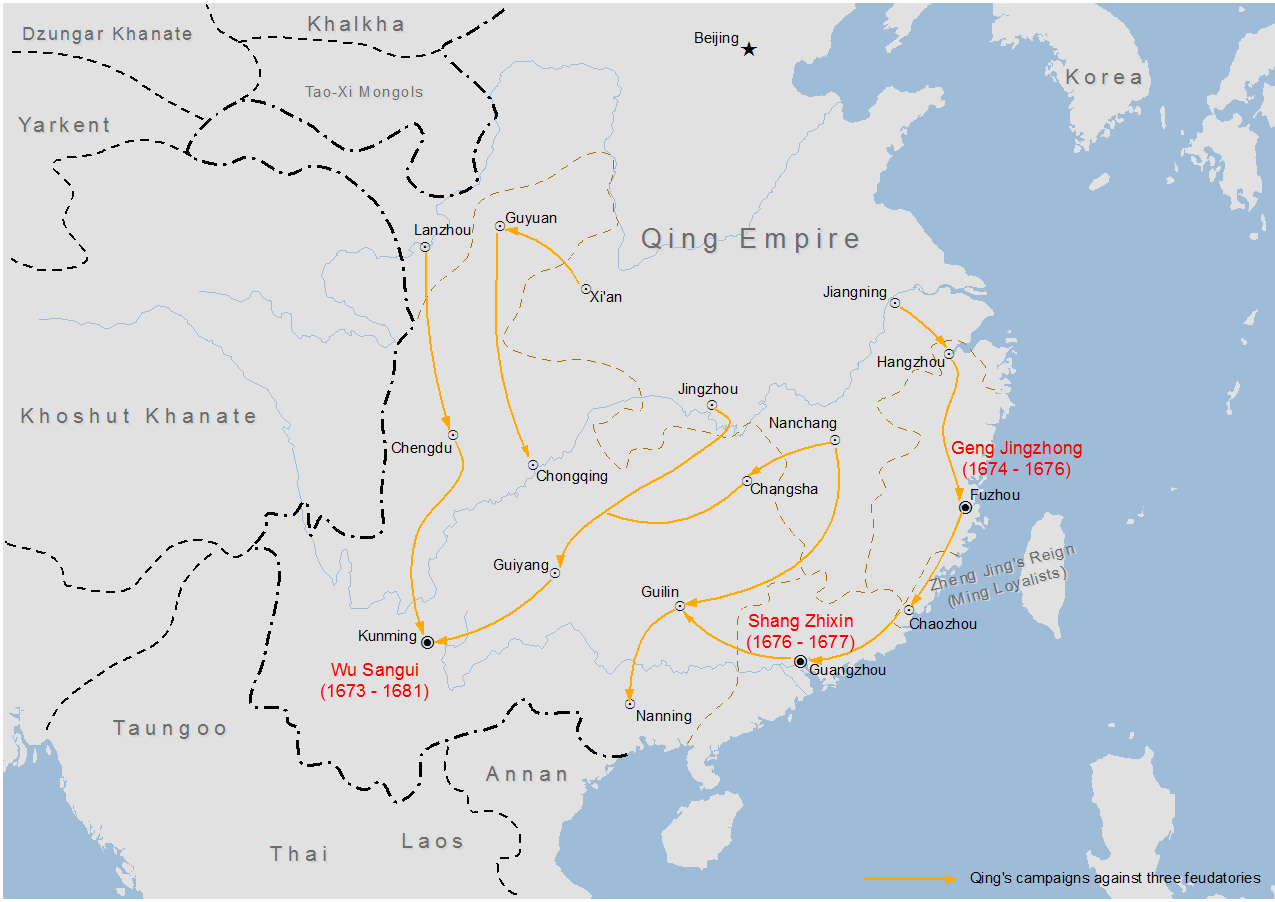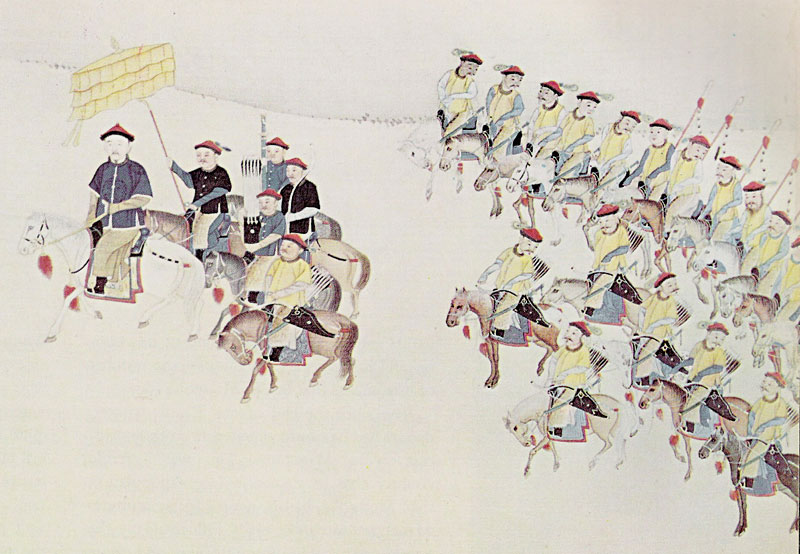|
1678
Events January–March * January 10 – England and the Dutch Republic sign a mutual defense treaty in order to fight against France. * January 27 – The first fire engine company in North America goes into service in Boston. * February 18 – The first part of English nonconformist preacher John Bunyan's Christian allegory ''The Pilgrim's Progress'' is published in London. * March 21 – Thomas Shadwell's comedy '' A True Widow'' is given its first performance, at The Duke's Theatre in London, staged by the Duke's Company. * March 23 – Revolt of the Three Feudatories in southern China: rebel general Wu Sangui, lord of the Yunnan fief, takes the imperial crown, names himself monarch of "The Great Zhou", based in the Hunan province, with Hengyang as his capital. He contracts dysentery over the summer and dies on October 2, ending the rebellion against the Kangxi Emperor. * March 25 – The Spanish Netherlands city of Ypres falls after a seve ... [...More Info...] [...Related Items...] OR: [Wikipedia] [Google] [Baidu] |
Wu Sangui
Wu Sangui (; 8 June 1612 – 2 October 1678), courtesy name Changbai () or Changbo (), was a Chinese military leader who played a key role in the fall of the Ming dynasty and the founding of the Qing dynasty. In Chinese folklore, Wu Sangui is regarded as a disreputable Hanjian, Han Chinese traitor for his defection over to the Manchu people, Manchu invaders, suppression of the Southern Ming resistance and execution of the Zhu Youlang, Yongli Emperor. Wu eventually double-crossed both of his masters, the Ming and the Qing dynasties. In 1644, Wu was a Ming general in charge of garrisoning Shanhai Pass, the strategic choke point between Manchuria and Beijing. After learning that Li Zicheng's rebel army had conquered Beijing and captured his family, including his father Wu Xiang (Ming general), Wu Xiang and concubine Chen Yuanyuan, Wu allowed the Manchu to enter China proper through Shanhai Pass to drive Li from Beijing, where the Manchu then set up the Qing dynasty. For his aid, th ... [...More Info...] [...Related Items...] OR: [Wikipedia] [Google] [Baidu] |
The Pilgrim's Progress
''The Pilgrim's Progress from This World, to That Which Is to Come'' is a 1678 Christian allegory written by John Bunyan. It is commonly regarded as one of the most significant works of Protestant devotional literature and of wider early modern English literature. It has been translated into more than 200 languages and has never been out of print. It appeared in Dutch in 1681, in German in 1703 and in Swedish in 1727. The first North American edition was issued in 1681.Lyons, M. (2011). Books: A Living History. Getty Publications. It has also been cited as the first novel written in English. According to literary editor Robert McCrum, "there's no book in English, apart from the Bible, to equal Bunyan's masterpiece for the range of its readership, or its influence on writers as diverse as William Hogarth, C. S. Lewis, Nathaniel Hawthorne, Herman Melville, Charles Dickens, Louisa May Alcott, George Bernard Shaw, William Thackeray, Charlotte Bronte, Mark Twain, John Steinbeck a ... [...More Info...] [...Related Items...] OR: [Wikipedia] [Google] [Baidu] |
Siege Of Ypres (1678)
The siege of Ypres in the Spanish Netherlands took place between March 18 and March 25, 1678, as part of the Franco-Dutch War, and ended with the conquest of the city by the French. Prelude In October 1677, Mary Stuart, niece and possible successor of Charles II of England, married William III of Orange, concluding the rapprochement between England and the Dutch Republic, who had been at war with each other until 1674. Louis XIV decided to invade the Spanish Netherlands to counter a possible English military intervention against him. The Dutch expected an attack against Namur. But Louis XIV directed his troops towards Ghent, taking the city on March 9, and then turned immediately west in the direction of Ypres. Siege On March 18, the French, led by Vauban, started digging approach trenches towards the citadel. The city was defended by a Spanish garrison under Dom Francisco de Pardo, who ordered the surroundings of the city flooded. But the French had already advanced t ... [...More Info...] [...Related Items...] OR: [Wikipedia] [Google] [Baidu] |
John Bunyan
John Bunyan (; 1628 – 31 August 1688) was an English writer and preacher. He is best remembered as the author of the Christian allegory ''The Pilgrim's Progress'', which also became an influential literary model. In addition to ''The Pilgrim's Progress'', Bunyan wrote nearly sixty titles, many of them expanded sermons. Bunyan came from the village of Elstow, near Bedford. He had some schooling and, at the age of sixteen, joined the New Model Army, Parliamentary Army at Newport Pagnell during the First English Civil War, first stage of the English Civil War. After three years in the army, he returned to Elstow and took up the trade of tinker, which he had learned from his father. He became interested in religion after his marriage, attending first the parish church and then joining the Bedford Meeting, a Puritan Nonconformist (Protestantism), Nonconformist group in St John's church Bedford, and later became a preacher. After the Restoration (England), restoration of the monarch ... [...More Info...] [...Related Items...] OR: [Wikipedia] [Google] [Baidu] |
A True Widow
''A True Widow'' is a 1678 comedy play by the English writer Thomas Shadwell. It was first staged by the Duke's Company at the Dorset Garden Theatre in London. The names of the original cast are unknown. The prologue was written by Shadwell's colleague John Dryden John Dryden (; – ) was an English poet, literary critic, translator, and playwright who in 1668 was appointed England's first Poet Laureate of the United Kingdom, Poet Laureate. He is seen as dominating the literary life of Restoration (En ....Van Lennep p.269 It was published the following year and dedicated to Charles Sedley. References Bibliography * Canfield, J. Douglas. ''Tricksters and Estates: On the Ideology of Restoration Comedy''. University Press of Kentucky, 2014. * Van Lennep, W. ''The London Stage, 1660-1800: Volume One, 1660-1700''. Southern Illinois University Press, 1960. 1678 plays West End plays Plays by Thomas Shadwell Restoration comedy {{17thC-play-stub ... [...More Info...] [...Related Items...] OR: [Wikipedia] [Google] [Baidu] |
Spanish Netherlands
The Spanish Netherlands (; ; ; ) (historically in Spanish: , the name "Flanders" was used as a '' pars pro toto'') was the Habsburg Netherlands ruled by the Spanish branch of the Habsburgs from 1556 to 1714. They were a collection of States of the Holy Roman Empire in the Low Countries held in personal union by the Spanish Crown. This region comprised most of the modern states of Belgium and Luxembourg, as well as parts of northern France, the southern Netherlands, and western Germany, with the capital being Brussels. The Army of Flanders was given the task of defending the territory. The Imperial fiefs of the former Burgundian Netherlands had been inherited by the Austrian House of Habsburg from the extinct House of Valois-Burgundy upon the death of Mary of Burgundy in 1482. The Seventeen Provinces formed the core of the Habsburg Netherlands, which passed to the Spanish Habsburgs upon the abdication of Emperor Charles V in 1556. When part of the Netherlands separated to ... [...More Info...] [...Related Items...] OR: [Wikipedia] [Google] [Baidu] |
Revolt Of The Three Feudatories
The Revolt of the Three Feudatories, () also known as the Rebellion of Wu Sangui, was a rebellion lasting from 1673 to 1681 in the early Qing dynasty of China, during the reign of the Kangxi Emperor (r. 1661–1722). The revolt was led by Wu Sangui, Shang Zhixin and Geng Jingzhong, the three ethnic Han lords of Yunnan, Guangdong and Fujian provinces whose hereditary titles were given to them for defecting to and helping the Qing dynasty conquer China proper, who rebelled after the Qing central government started abolishing their fiefs. The feudatories were supported by Zheng Jing's Kingdom of Tungning on the island of Taiwan, which sent forces to invade Mainland China. Additionally, minor Han military figures, such as Wang Fuchen, and the Chahar Mongols, also revolted against Qing rule. Due to their history as defectors that helped to topple the Southern Ming dynasty, the Three Feudatories failed to win over the support of the general Han populace and were eventually def ... [...More Info...] [...Related Items...] OR: [Wikipedia] [Google] [Baidu] |
Kangxi Emperor
The Kangxi Emperor (4 May 165420 December 1722), also known by his temple name Emperor Shengzu of Qing, personal name Xuanye, was the third emperor of the Qing dynasty, and the second Qing emperor to rule over China proper. His reign of 61 years makes him the longest-reigning emperor in Chinese history and one of the longest-reigning rulers in history. He is considered one of China's greatest emperors. The third son of the Shunzhi Emperor, Kangxi was enthroned at the age of seven while actual power was held for six more years by the four regents nominated by his father. After assuming personal rule, Kangxi's attempt to revoke the fiefdoms of feudal princes sparked the Revolt of the Three Feudatories, which he suppressed. He also forced the Kingdom of Tungning in Taiwan and Mongols in the north and northwest to submit to Qing rule, and launched an expedition that incorporated Tibet into the empire. Domestically, he initially welcomed the Jesuits and the propagation of ... [...More Info...] [...Related Items...] OR: [Wikipedia] [Google] [Baidu] |
Ypres
Ypres ( ; ; ; ; ) is a Belgian city and municipality in the province of West Flanders. Though the Dutch name is the official one, the city's French name is most commonly used in English. The municipality comprises the city of Ypres/Ieper and the villages of Boezinge, Brielen, Dikkebus, Elverdinge, Hollebeke, Sint-Jan, Vlamertinge, Voormezele, Zillebeke, and Zuidschote. Together, they are home to about 34,900 inhabitants. During the First World War, Ypres (or "Wipers" as it was commonly known by the British troops) was the centre of the Battles of Ypres between German and Allied forces. History Origins Ypres is an ancient town, known to have been raided by the Romans in the first century BC. It is first mentioned by name in 1066 and is probably named after the river Ieperlee on the banks of which it was founded. During the Middle Ages, Ypres was a prosperous Flemish city with a population of 40,000 in 1200 AD, renowned for its linen trade with England, which w ... [...More Info...] [...Related Items...] OR: [Wikipedia] [Google] [Baidu] |
March 28
Events Pre-1600 * AD 37 – Roman emperor Caligula accepts the titles of the Principate, bestowed on him by the Senate. * 193 – After assassinating the Roman Emperor Pertinax, his Praetorian Guards auction off the throne to Didius Julianus. * 364 – Roman Emperor Valentinian I appoints his brother Flavius Valens co-emperor. * 1065 – The Great German Pilgrimage, which had been under attack by Bedouin bandits for three days, is rescued by the Fatimid governor of Ramla. * 1566 – The foundation stone of Valletta, Malta's capital city, is laid by Jean Parisot de Valette, Grand Master of the Sovereign Military Order of Malta. 1601–1900 * 1745 – War of the Austrian Succession: In the Battle of Vilshofen, Austrian forces defeat French forces. * 1776 – Juan Bautista de Anza finds the site for the Presidio of San Francisco. *1795 – Partitions of Poland: The Duchy of Courland and Semigallia, a northern fief of the Polish� ... [...More Info...] [...Related Items...] OR: [Wikipedia] [Google] [Baidu] |
Belgium
Belgium, officially the Kingdom of Belgium, is a country in Northwestern Europe. Situated in a coastal lowland region known as the Low Countries, it is bordered by the Netherlands to the north, Germany to the east, Luxembourg to the southeast, France to the south, and the North Sea to the west. Belgium covers an area of and has a population of more than 11.8 million; its population density of ranks List of countries and dependencies by population density, 22nd in the world and Area and population of European countries, sixth in Europe. The capital and Metropolitan areas in Belgium, largest metropolitan region is City of Brussels, Brussels; other major cities are Antwerp, Ghent, Charleroi, Liège, Bruges, Namur, and Leuven. Belgium is a parliamentary system, parliamentary constitutional monarchy with a complex Federation, federal system structured on regional and linguistic grounds. The country is divided into three highly autonomous Communities, regions and language areas o ... [...More Info...] [...Related Items...] OR: [Wikipedia] [Google] [Baidu] |






